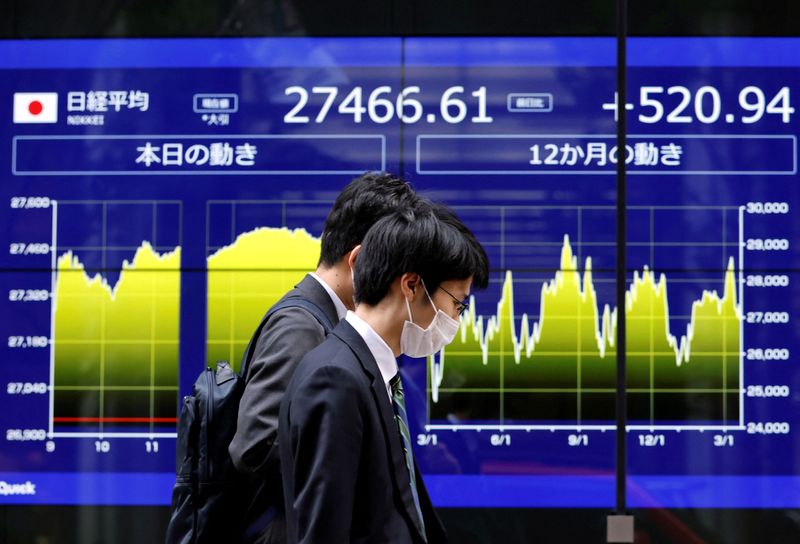 © Reuters. FILE PHOTO: Passersby walk past an electric monitor displaying Japan's Nikkei share average and recent movements outside a bank in Tokyo, Japan, March 22, 2023. REUTERS/Issei Kato
© Reuters. FILE PHOTO: Passersby walk past an electric monitor displaying Japan's Nikkei share average and recent movements outside a bank in Tokyo, Japan, March 22, 2023. REUTERS/Issei Kato
By Stephen Culp
NEW YORK (Reuters) - U.S. stocks sold off, closing deep in negative territory, and Treasury yields dropped on Tuesday as disappointing earnings and soft economic data fueled recession fears, sending investors fleeing for safe havens.
All three major indexes ended the session down 1% or more, with the tech-laden Nasdaq plunging 2%, its biggest single-day slide since March 9.
The S&P 500 and the Dow suffered their largest one-day percentage drops in a month.
"The type of environment where both gold and dollar gain, it's very much risk-off high-volatility stuff," said Ross Mayfield, investment strategy analyst at Baird in Louisville, Kentucky.
Those losses deepened after a report showed a steeper-than-expected decline in consumer confidence.
Earnings from a wide range of companies, including 3M Co, General Motors Co (NYSE:GM), PepsiCo (NASDAQ:PEP) Inc, United Parcel Service Inc (NYSE:UPS) and McDonald's (NYSE:MCD) Inc, provided a mixed picture of corporate profit and outlook.
First Republic Bank (NYSE:FRC), under pressure amid regional bank liquidity concerns, reported a plunge in deposits that sent its shares, along with the broader KBW regional banking index, sharply lower.
"The more cyclical and economically sensitive companies have missed (earnings estimates) or guided down, while consumer staples have done well," Mayfield said. "And that suggests a weakening economic environment that maybe wasn't priced into the market."
Shares of Microsoft Corp (NASDAQ:MSFT) and Alphabet (NASDAQ:GOOGL) Inc rose in extended trading after reporting results.
The Dow Jones Industrial Average fell 344.57 points, or 1.02%, to 33,530.83, the S&P 500 lost 65.41 points, or 1.58%, to 4,071.63 and the Nasdaq Composite dropped 238.05 points, or 1.98%, to 11,799.16.
European stocks lost ground as investors weighed generally upbeat earnings against comments by European Central Bank policymakers regarding the future path of interest rates.
Spanish stocks had their worst day in a month, as Santander (BME:SAN) led a slide in European bank shares.
The pan-European STOXX 600 index lost 0.40% and MSCI's gauge of stocks across the globe shed 1.32%.
Emerging market stocks lost 1.30%. MSCI's broadest index of Asia-Pacific shares outside Japan closed 1.37% lower, while Japan's Nikkei rose 0.09%.
Benchmark Treasury yields posted their steepest drop since March as market participants juggled concerns over the looming debt ceiling deadline and ongoing worries - exacerbated by First Republic results - of a liquidity crisis in the regional banking sector.
(Graphic: Treasury yield spreads - https://www.reuters.com/graphics/USA-STOCKS/gkvlwalylpb/treasuryspreads.png)
Benchmark 10-year notes last rose 32/32 in price to yield 3.3939%, from 3.515% late on Monday.
The 30-year bond rose 44/32 in price to yield 3.6525%, from 3.729% late on Monday.
The greenback gained ground against a basket of world currencies and the euro retreated from a near 10-month high as worries over corporate results and the global economic outlook deepened.
The dollar index rose 0.51%, with the euro down 0.62% to $1.0973.
The Japanese yen strengthened 0.48% versus the greenback at 133.60 per dollar, while Sterling was last trading at $1.2407, down 0.60% on the day.
Argentina's peso tumbled to a record low on the popular black market amid uncertainties surrounding the country's upcoming election, prompting its economic minister to pledge "all tools" to counter the currency's dangerous slide.
Crude prices reversed Monday's gain, plunging as economic worries and the strong dollar offset optimism over China demand expectations.
U.S. crude dropped 2.25% to settled at $77.07 per barrel, and Brent settled at $80.77 per barrel, down 2.37% on the day.
Gold prices gained as investors awaited a slew of economic data later in the week that could sway the Federal Reserve's policy decisions.
Spot gold added 0.4% to $1,997.63 an ounce.

